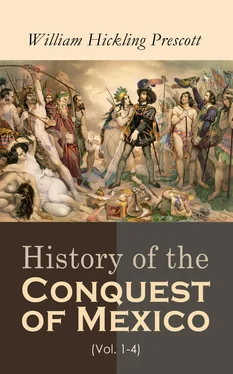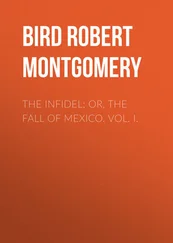He accordingly sent an order to the chief of Tepechpan to take command of an expedition set on foot against the Tlascalans. At the same time he instructed two Tezcucan chiefs to keep near the person of the old lord, and bring him into the thickest of the fight, where he might lose his life. He assured them this had been forfeited by a great crime, but that, from regard for his vassal’s past services, he was willing to cover up his disgrace by an honorable death.
The veteran, who had long lived in retirement on his estates, saw himself with astonishment called so suddenly and needlessly into action, for which so many younger men were better fitted. He suspected the cause, and, in the farewell entertainment to his friends, uttered a presentiment of his sad destiny. His predictions were too soon verified; and a few weeks placed the hand of his virgin bride at her own disposal.
Nezahualcoyotl did not think it prudent to break his passion publicly to the princess so soon after the death of his victim. He opened a correspondence with her through a female relative, and expressed his deep sympathy for her loss. At the same time, he tendered the best consolation in his power, by an offer of his heart and hand. Her former lover had been too well stricken in years for the maiden to remain long inconsolable. She was not aware of the perfidious plot against his life; and, after a decent time, she was ready to comply with her duty, by placing herself at the disposal of her royal kinsman.
It was arranged by the king, in order to give a more natural aspect to the affair and prevent all suspicion of the unworthy part he had acted, that the princess should present herself in his grounds at Tezcotzinco, to witness some public ceremony there. Nezahualcoyotl was standing in a balcony of the palace when she appeared, and inquired, as if struck with her beauty for the first time, “who the lovely young creature was, in his gardens.” When his courtiers had acquainted him with her name and rank, he ordered her to be conducted to the palace, that she might receive the attentions due to her station. The interview was soon followed by a public declaration of his passion; and the marriage was celebrated not long after, with great pomp, in the presence of his court, and of his brother monarchs of Mexico and Tlacopan. [317]
This story, which furnishes so obvious a counterpart to that of David and Uriah, is told with great circumstantiality, both by the king’s son and grandson, from whose narratives Ixtlilxochitl derived it. [318]They stigmatize the action as the basest in their great ancestor’s life. It is indeed too base not to leave an indelible stain on any character, however pure in other respects, and exalted.
The king was strict in the execution of his laws, though his natural disposition led him to temper justice with mercy. Many anecdotes are told of the benevolent interest he took in the concerns of his subjects, and of his anxiety to detect and reward merit, even in the most humble. It was common for him to ramble among them in disguise, like the celebrated caliph in the “Arabian Nights,” mingling freely in conversation, and ascertaining their actual condition with his own eyes. [319]
On one such occasion, when attended only by a single lord, he met with a boy who was gathering sticks in a field for fuel. He inquired of him “why he did not go into the neighboring forest, where he would find a plenty of them.” To which the lad answered, “It was the king’s wood, and he would punish him with death if he trespassed there.” The royal forests were very extensive in Tezcuco, and were guarded by laws full as severe as those of the Norman tyrants in England. “What kind of man is your king?” asked the monarch, willing to learn the effect of these prohibitions on his own popularity. “A very hard man,” answered the boy, “who denies his people what God has given them.” [320]Nezahualcoyotl urged him not to mind such arbitrary laws, but to glean his sticks in the forest, as there was no one present who would betray him. But the boy sturdily refused, bluntly accusing the disguised king, at the same time, of being a traitor, and of wishing to bring him into trouble.
Nezahualcoyotl, on returning to the palace, ordered the child and his parents to be summoned before him. They received the orders with astonishment, but, on entering the presence, the boy at once recognized the person with whom he had discoursed so unceremoniously, and he was filled with consternation. The good-natured monarch, however, relieved his apprehensions, by thanking him for the lesson he had given him, and, at the same time, commended his respect for the laws, and praised his parents for the manner in which they had trained their son. He then dismissed the parties with a liberal largess, and afterwards mitigated the severity of the forest laws, so as to allow persons to gather any wood they might find on the ground, if they did not meddle with the standing timber. [321]
Another adventure is told of him, with a poor woodman and his wife, who had brought their little load of billets for sale to the market-place of Tezcuco. The man was bitterly lamenting his hard lot, and the difficulty with which he earned a wretched subsistence, while the master of the palace before which they were standing lived an idle life, without toil, and with all the luxuries in the world at his command.
He was going on in his complaints, when the good woman stopped him, by reminding him he might be overheard. He was so, by Nezahualcoyotl himself who, standing screened from observation at a latticed window which overlooked the market, was amusing himself, as he was wont, with observing the common people chaffering in the square. He immediately ordered the querulous couple into his presence. They appeared trembling and conscience-struck before him. The king gravely inquired what they had said. As they answered him truly, he told them they should reflect that, if he had great treasures at his command, he had still greater calls for them; that, far from leading an easy life, he was oppressed with the whole burden of government; and concluded by admonishing them “to be more cautious in future, as walls had ears.” [322]He then ordered his officers to bring a quantity of cloth and a generous supply of cacao (the coin of the country), and dismissed them. “Go,” said he; “with the little you now have, you will be rich; while, with all my riches, I shall still be poor.” [323]
It was not his passion to hoard. He dispensed his revenues munificently, seeking out poor but meritorious objects on whom to bestow them. He was particularly mindful of disabled soldiers, and those who had in any way sustained loss in the public service, and, in case of their death, extended assistance to their surviving families. Open mendicity was a thing he would never tolerate, but chastised it with exemplary rigor. [324]
It would be incredible that a man of the enlarged mind and endowments of Nezahualcoyotl should acquiesce in the sordid superstitions of his countrymen, and still more in the sanguinary rites borrowed by them from the Aztecs. In truth, his humane temper shrunk from these cruel ceremonies, and he strenuously endeavored to recall his people to the more pure and simple worship of the ancient Toltecs. A circumstance produced a temporary change in his conduct.
He had been married some years to the wife he had so unrighteously obtained, but was not blessed with issue. The priests represented that it was owing to his neglect of the gods of his country, and that his only remedy was to propitiate them by human sacrifice. The king reluctantly consented, and the altars once more smoked with the blood of slaughtered captives. But it was all in vain; and he indignantly exclaimed, “These idols of wood and stone can neither hear nor feel; much less could they make the heavens, and the earth, and man, the lord of it. These must be the work of the all-powerful, unknown God, Creator of the universe, on whom alone I must rely for consolation and support.” [325]
Читать дальше












